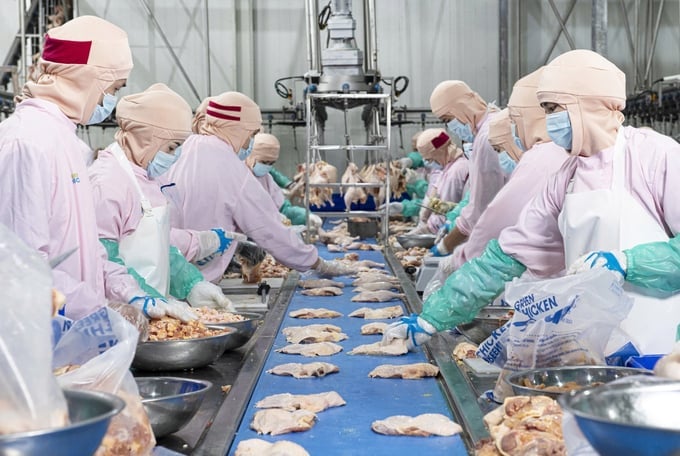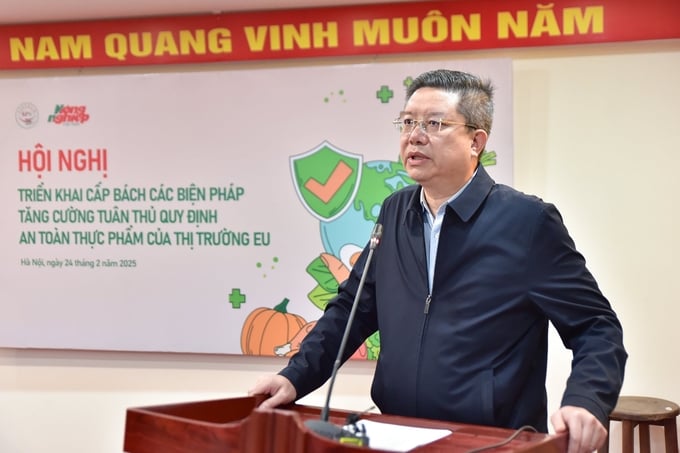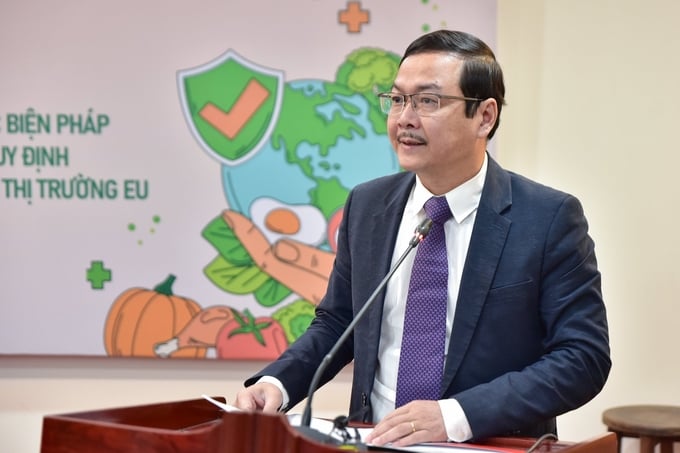November 26, 2025 | 18:06 GMT +7
November 26, 2025 | 18:06 GMT +7
Hotline: 0913.378.918
November 26, 2025 | 18:06 GMT +7
Hotline: 0913.378.918

The EU market demands exceptionally high standards of quality and food safety. Products must comply with SPS regulations (covering food safety, sanitary and phytosanitary measures, food additives, etc.), as well as Technical Barriers to Trade (TBT) and maximum residue level (MRL) requirements.
On February 24, Vietnam Agriculture News, in collaboration with the Vietnam SPS Office, held a conference on the urgent implementation of measures to strengthen compliance with EU food safety regulations.
The EU is a significant market for Vietnam, where agricultural, forestry, fisheries, and processed food products have steadily cemented their positions. Exports to the EU market in general—and agricultural products in particular—have experienced robust growth, notably for commodities such as coffee, cashew, pepper, tropical fruits, and seafood.
According to the SPS Vietnam Office’s report, trends in green consumption, organic produce, and certified products will undoubtedly open up considerable opportunities for Vietnamese agricultural products. Furthermore, Vietnam benefits from favorable conditions for producing a variety of unique agricultural items not found in the EU, such as dragon fruit, mango, passion fruit, lychee, and longan—an advantage for indigenous products.

Dr. Le Thanh Hoa, Director of the Vietnam SPS Office. Photo: Tung Dinh.
However, the EU market demands exceptionally high standards of quality and food safety. Products must comply with SPS regulations (covering food safety, sanitary and phytosanitary measures, food additives, etc.), as well as Technical Barriers to Trade (TBT) and maximum residue level (MRL) requirements.
Many of Vietnam’s agricultural products are exported in raw form, competing primarily on price with limited added value in terms of quality, branding, and traceability according to EU standards. Moreover, many export enterprises have not fully updated their practices to align with the new EU regulations for agricultural products.
In 2024, Vietnam received 14 warnings from the EU—double the number from the previous year. One reason originates from the incomplete acknowledgment by enterprises, organizations, and individuals. Since the EU does not regulate export volume, packages weighing only a few kilograms—or even hand luggage—are subject to inspection.
Upon any violation or failure to meet market regulations, the EU issues an immediate warning. For products receiving a high-level warning, failure to promptly address issues may result in an import ban.
In addition to enhancing criteria for export products, the EU has introduced other specific regulations. For example, in 2023, the EU initiated deforestation regulations (EUDR), expected to take effect in 2025. Under these rules, products produced and processed in areas at risk of deforestation will be rejected for importation. These regulations directly affect three of Vietnam’s agricultural strengths: wood, coffee, and rubber.
In response to these urgent requirements, the SPS Vietnam Office, in collaboration with Vietnam Agriculture News, convened a conference on the urgent implementation of measures to strengthen compliance with EU food safety regulations.
The conference was attended by departments of plant production, livestock production, and animal health; as well as agencies of quality, processing, and market development, alongside representatives from local authorities, associations, enterprises, and cooperatives. The event served to inform, publicize, and provide guidance on updates and comprehensive responses to all EU regulations concerning food safety and quarantine.

Mr. Nguyen Ngoc Thach, Editor-in-Chief of Vietnam Agriculture News. Photo: Tung Dinh.
Dr. Le Thanh Hoa, Director of the Vietnam SPS Office, stated that implementing, informing, and instructing on changes and draft bills from WTO members is a regular task for the office.
This unit, assigned by the Government, serves as the focal point for transparently disseminating market updates, as well as supporting plant and animal quarantine measures to help export organizations and individuals grasp market regulations and ensure smooth trade activities with the EU.
“In the initial stage when Vietnam joined the WTO in 2005, approximately 600 warnings were issued to Vietnam. However, after the implementation of synchronized support measures, compliance with food and agricultural product requirements has been on the right track,” Dr. Hoa shared.
According to Mr. Nguyen Ngoc Thach, Editor-in-Chief of Vietnam Agriculture News, the issue of Vietnam’s agricultural exports receiving EU warnings is one of the hot topics closely followed by the media. This is largely due to enterprises failing to register novel foods and composite products containing new components that violate EU regulations, leading to non-endorsement. Additionally, such components may trigger allergies in consumers, raising concerns over transparency and food safety.
To prevent these failures and identify solutions to enhance communication and instruction for production facilities and agricultural exporters in adhering to regulations, Vietnam Agriculture News has collaborated with several entities to host conferences and forums aimed at elevating product quality to meet the demands of export markets, especially the EU.

(VAN) After the institutional merger, Da Nang possesses significant forest-carbon reserves and is proactively engaging in the carbon market, creating a new revenue stream.

(VAN) An Giang strengthens communication against IUU fishing, increases inspections and sanctions, and is determined to remove the EC’s “yellow card” while developing a sustainable fisheries sector.

(VAN) As green transition becomes a global trajectory, Viet Nam’s biggest challenge is not only technology and models, but how to ensure that capital flows reach the right beneficiaries.

(VAN) The Ministry of Agriculture and Environment must spearhead the construction of green governance, spanning decision-making processes and investment standards to policy evaluation mechanisms.

(VAN) The Agriculture and Environment sector of Khanh Hoa has achieved numerous milestones over the past 80 years, contributing significantly to the goal of establishing the province as a centrally governed city by 2030.

(VAN) Viet Nam is entering the pivotal period of 2025-2030, moving toward the formulation of the Remote Sensing Law, which will establish a legal foundation for the development of national digital data.

(VAN) The agricultural sector is finalizing the strategic framework for emission reduction, setting the goal of sharply cutting methane and 403.7 million tons of CO2 equivalent and moving toward Net Zero by 2050.